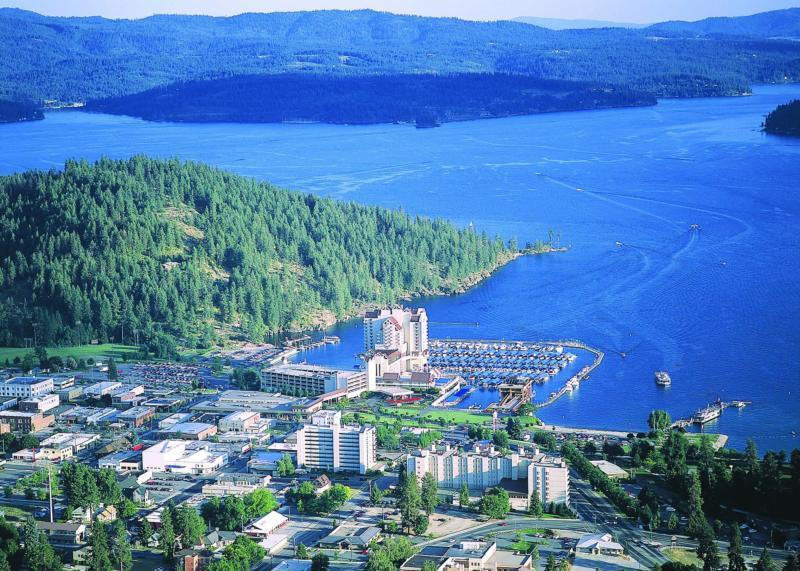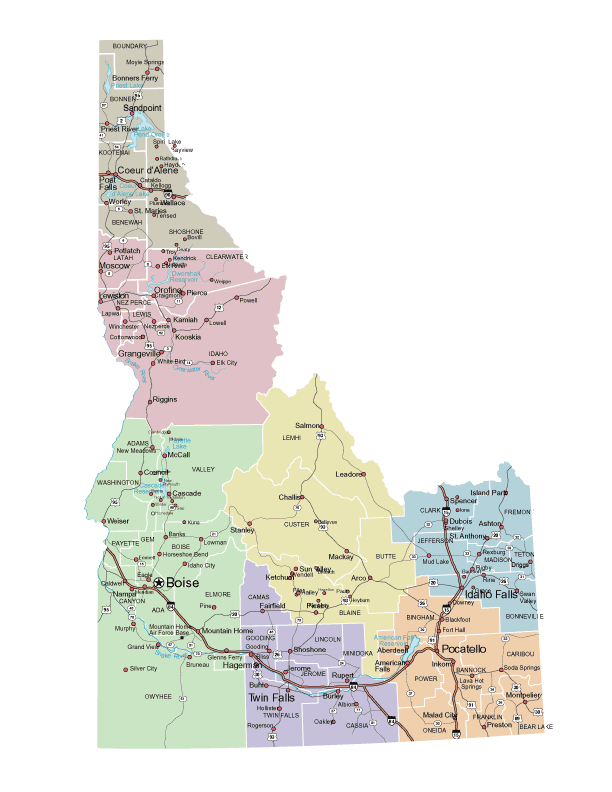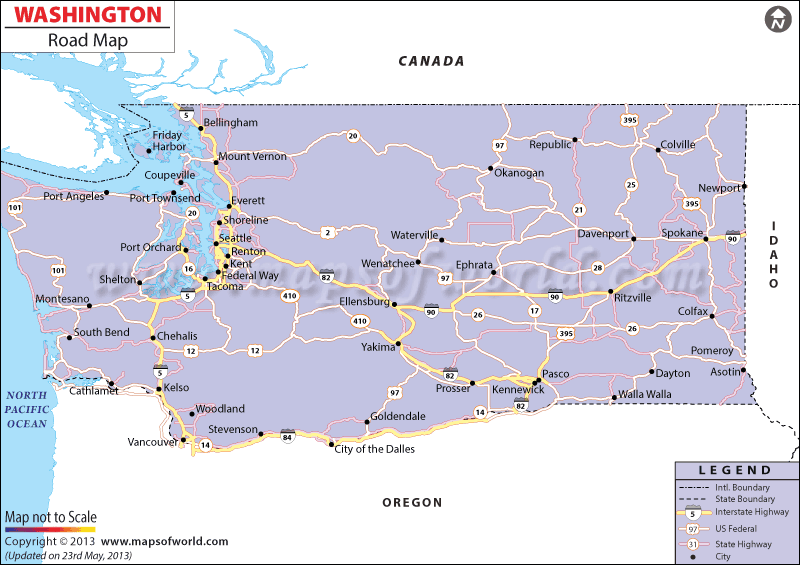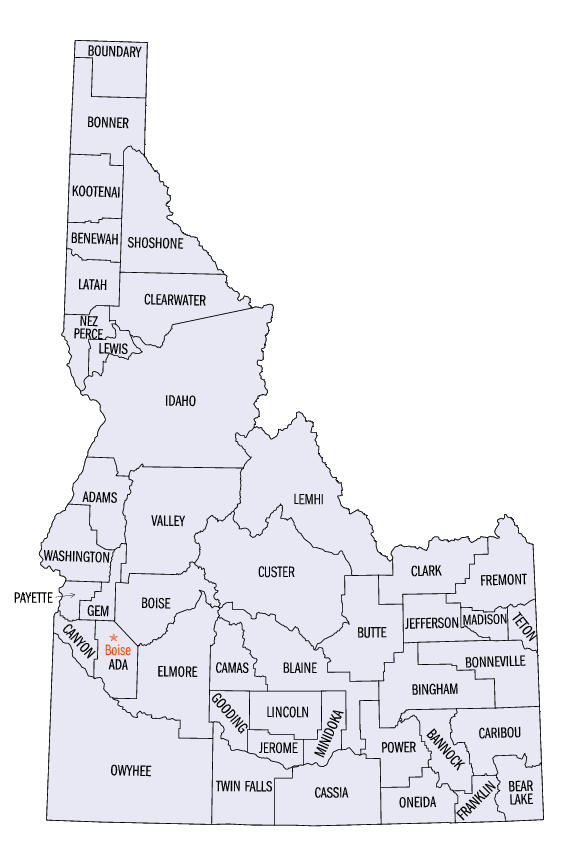Blue Highways: Bonner's Ferry, Idaho
Unfolding the Map
 At Bonner's Ferry we turn east after getting almost as far north as we can go in the United States. William Least Heat-Moon (LHM) and Arthur O. Bakke are deep in discussion about spiritual and earthly matters, and LHM admires the simplicity of Bakke's life. We'll reflect on simplicity too. Take a look at the map for Bonner's Ferry.
At Bonner's Ferry we turn east after getting almost as far north as we can go in the United States. William Least Heat-Moon (LHM) and Arthur O. Bakke are deep in discussion about spiritual and earthly matters, and LHM admires the simplicity of Bakke's life. We'll reflect on simplicity too. Take a look at the map for Bonner's Ferry.
Book Quote
"At Bonner's Ferry, where U.S. 2 ran a long, deep break in the Bitterroot Mountains, we turned toward Montana....
"'You've got necessities in one box, your work in a briefcase, a creed in your shirt pocket. I admire the compression of it. I wish I could reduce it all to a couple of boxes. I like your self-sufficiency.'
"'Don't give me so much credit. Paul preached how pride separates us from God....'
"'Maybe so, but for basic necessity, you come close to material self-sufficiency.' Bakke sat quietly. 'The college students you talk to, they must admire your on-the-road work, your freedom.'
"'I don't think many would trade places with me. Would you?'
"It was a terrible question.
"'I don't have your belief or purpose. But I wish I knew what you know.'"
"''Knowledge puffeth up, but charity edifieth. If any man think that he knoweth any thing, he knoweth nothing yet as he ought to know.' First Corinithians eight: one and two. Knowledge of the Lord is the knowledge worth knowing.'"
Blue Highways: Part 7, Chapter 3
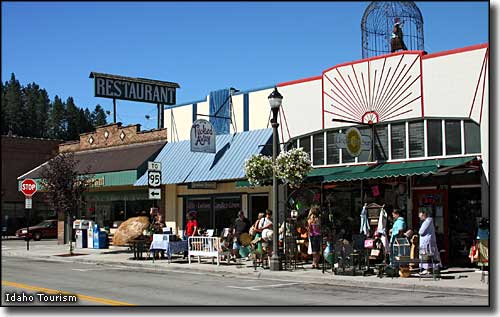 Downtown Bonner's Ferry. Photo by the Idaho Department of Tourism and posted at the Sangres.com website. Click on photo to go to host page.
Downtown Bonner's Ferry. Photo by the Idaho Department of Tourism and posted at the Sangres.com website. Click on photo to go to host page.
Bonner's Ferry, Idaho
I love the idea of living simply. I just suck at it.
I don't want to give the impression that I have a lot of money. I'm comfortably middle-class - a public-sector worker at a university medical school with a good salary, decent benefits and, barring a total collapse of the health-care economy, a job for life. I earn some extra on the side teaching political science courses. In a good year, I might earn up to $15,000 on top of my annual salary. My wife also has a decent job as a business reporter. I am intensely aware that I am lucky given that there are so many people that are jobless. I am also lucky in that I am not under crushing amounts of debt. Our car is one payment away from being completely paid off. We don't have a mortgage. I have about $20,000 outstanding in student loans which I always considered more of an investment than a debt. We rarely keep debt on our credit cards any more.
Lately, however, the idea of living simply in a way that produces growth and harmony has come roaring back at me.
I was introduced in my early twenties to the concept of a simple lifestyle. Just out of college I had joined a program called the Jesuit Volunteer Corps (JVC), and went to live in inner-city Milwaukee in an intentional community with other volunteers. All of us worked in a not-for-profit social or environmental justice organizations - I worked in an inner-city school as an aide. In exchange for our work, the agencies paid for our insurance and travel, and gave us a stipend of $300 per month. Out of that $300 I was able to take $75 for my own personal expenses; the rest went into the pot for rent, food, utilities and other house expenses.
JVC operated according to these four tenets: social justice, community, spirituality, and simple lifestyle - all influenced by Catholic social teaching. The unofficial motto of JVC was "ruined for life." I initially joined for one year, but re-joined for a second year in a different job - working with unemployed people. It was during this time that I learned how to make $75 stretch for one month (easier, I admit, in the 1980s than it is now). However, that meant curtailing my time on the phone (no cell phones but long distance plans back then!), not buying candy bars or sodas, limiting my time out in bars or doing other fun stuff. As a community, we had to shop smartly and selectively and make things that we could stretch. We were pretty good at it - we accumulated enough money to help other communities that weren't making it as well and we were able to buy an old car so that we could reduce our reliance on other people for rides to the store.
A lot of time was spent together at home. We played games, we talked and we enjoyed each other's company as much as we could. We watched television and we read books. We became close as a community because there weren't many distractions, especially during the cold Milwaukee winters. It's hard not to look at that time through rose-colored glasses, because we were also five different personalities thrown in together. We fought sometimes, and we endured hardships - our house was broken into 6 times over two months and a group of us was attacked by gang members while walking to a bowling alley and two of us were beaten badly enough to go to the emergency room. Though I wasn't hurt, I began to experience the first of what would become on and off again panic attacks in response to stress.
I met my wife in the JVC. She was more in tune with Catholic social teaching than I was and already believed in the tenets of the program prior to her volunteer year. They made a big impression on me. Since that time, I have been drawn to social justice causes, and in doing work with the poor and disadvantaged. I continued to live in inner-city Milwaukee, and since I left there have never shied away from going into any inner-city areas.
But as our incomes began to rise, we gained a lot more physical and, for lack of a better term, metaphysical clutter. We became busy, and we did more. In my twenties and thirties, this seemed fine for me. I liked being busy. I enjoyed the things I did. However, focusing on all of the things we were doing let me ignore and avoid looking at things that I probably should have been putting more attention to.
About four years ago, I realized something was wrong. I wasn't exactly happy with the way things were going in my life. Upon some examination, I realized it was because my life was so busy. We have no children, so evenings were often (and still often) spent out. There were weeks where I wasn't home in the evening for 6-7 days. We weren't partying or anything like that. Instead, one night it might be a work function that my wife needed to attend, another night it might be a movie, a third night might be taken up by a late day at work then a late dinner, a fourth night might be another function, a fifth night might be dinner with a friend, the sixth night a play, and the seventh night, if it wasn't off, was perhaps devoted to some other gathering or event.
I looked around my house, and saw a cluttered lifestyle that was difficult to keep in check. The lack of time at home meant that we had let things build up and weren't putting things into their place or even paying attention to what we brought home and put down. The clutter of things was bad enough - the clutter of events and happenings was even worse. I realized that I had ignored myself. I wasn't giving myself any space to be alone, to ruminate on questions, to read and grow. All of this was leading to strain between my wife and I. We hadn't had kids, partly because of how active our life was, and suddenly when we thought we might try, we discovered we couldn't. This was a real blow to me. I had always pictured myself with a child, a daughter, and it was hard to accept that it might not happen.
I started examining myself, and my instinct was telling me that I had to de-clutter my life. I needed to make time for myself and get with reacquainted with me. And to that end I have been devoting myself with more or less success for the past two years. I say more or less success because I got sidetracked once, and at other times I have found it difficult to say no to people, including my wife. But I've worked my way to an awareness of what I need to do, and hope that it will translate into action.
Which is why, coming back to the quotes above, LHM's talk with Arthur O. Bakke resonates with me. Both in their way are seeking answers for themselves. Arthur believes he's found the answer in God and Jesus and in showing others the way to what he sees as truth. He has de-cluttered his life of earthly things in service to what awaits the good on the other side. LHM is also seeking answers to questions about himself and his life. He seeks them on the road, in literature and in making sense of his experiences and how they relate to his life as he travels. Both have left their previous lives behind in the hopes of finding something. They aren't dissimilar, which is probably why they grow to like each other. It is also symbolic that they are at a place that was a ferry. In a ferry, you cross a physical boundary to another place - from riverbank to riverbank, from city to country or vice-versa, or even from life to death.
I too seek answers. I've gone down some wrong paths, and yet I feel that I understand more than I did. I have a vision for what life must look like for me to be satisfied as I head into its second half. Unlike in the past, I also now have some motivation to cross my own boundaries to get there.
Musical Interlude
I heard this song on a strange little movie called Searching for the Wrong-Eyed Jesus. The song is a traditional ballad called Wayfaring Stranger and it is sung by David Eugene Edwards. I like how the road through symbolic darkness and woe leads to beauty and light. It's the life that most of us travel until we find what we need.
If you want to know more about Bonner's Ferry
I want to highlight that near Bonner's Ferry in 1974, the Kootenai Tribe declared war on the United States and posted tribal guards on the entrances into the towns where they asked motorists to pay a toll to drive through lands they claimed as theirs. While most tribes are forbidden by treaty to declare war on the U.S., the Kootenai never had a formal treaty. The United States conceded a small bit of land to end the dispute. The land became the Kootenai reservation.
Bonner's Ferry Chamber of Commerce
Bonner's Ferry Herald (newspaper)
City of Bonner's Ferry
newsbf.com
Sandpoint.com: Bonner's Ferry
Wikipedia: Bonner's Ferry
Next up: Kalispell, Montana




 Wednesday, December 7, 2011 at 5:19PM
Wednesday, December 7, 2011 at 5:19PM
